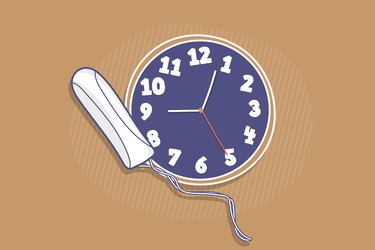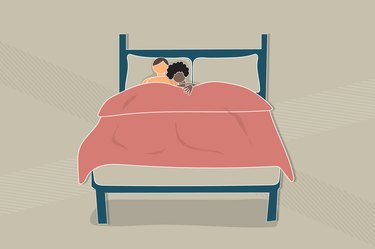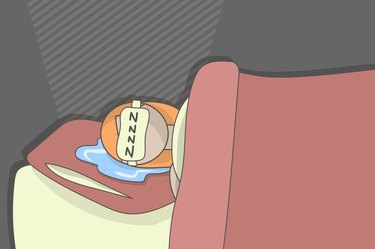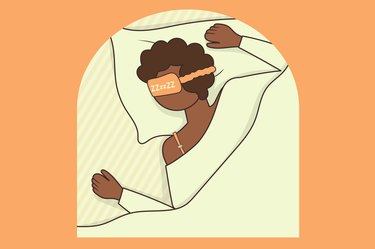
When it comes to sexy time, some things, like candles, wine and music, are marvelous for setting the mood. But others — like a yeast infection — can put a serious damper on your plans.
In general, dealing with a yeast infection is not ideal. It can be itchy and uncomfortable. However, you may still be wondering: "Is it safe to have sex with a yeast infection?"
Video of the Day
Here, Allison K. Rodgers, MD, a board-certified ob-gyn, reproductive endocrinologist and director of education at the Fertility Centers of Illinois, runs down the risks of having sex with a yeast infection and explains why you might want to abstain until you are healed.
First, What Is a Yeast Infection?
Also known as vaginal candidiasis, a yeast infection happens when there’s an overgrowth of candida (a kind of fungus) in the vagina.
While candida typically lives inside the vagina (and other body parts such as your skin, mouth, throat and gut) without causing any complications, certain changes in your body — including the use of some medications and a shift in hormones or your immune system — can disrupt the balanced mix of microbes in your vagina, according to the Centers for Disease Control and Prevention (CDC). This is when an infection occurs.
Signs of a yeast infection include, per the CDC:
- Vaginal itching or soreness
- Pain during sexual intercourse (more on this later)
- Pain or discomfort when urinating
- Abnormal vaginal discharge
- Redness, swelling and cracks in the wall of the vagina
Side Effects of Having Sex With a Yeast Infection
If you're thinking of having sex with a yeast infection, here are some issues it may cause.
1. It Can Be Painful and Irritate Your Vagina
"This is the main one — ouch," Dr. Rodgers says.
Since your vagina and vulva might already be itchy, sore and/or swollen, the friction created from getting frisky can further irritate the area, according to the Cleveland Clinic.
"You['ll] literally feel like you are holding a flame to your vagina," Dr. Rodgers says. Besides the vaginal burning during sex, you may feel burning when you pee, too.
"You probably won't want anything besides medication near there," she adds.
2. It Can Lengthen the Healing Process
In addition to redness and swelling, yeast infections can also create little cuts around the clitoris, vaginal opening or vulva, according to the Cleveland Clinic.
Penetrative sex of any kind (with a partner or sex toy) already has potential to cause microtraumas, or tiny tears, to the vagina, Dr. Rodgers says.
That means sex can increase the damage already done to the infected (and irritated) tissues of the vagina and vulva, prolonging your symptoms, Dr. Rodgers explains.
3. It Can Increase Your Risk of Sexually Transmitted Infections (STIs)
The tiny tears or cracks in vaginal tissue from sex (and yeast infections) can elevate risk for catching other types of infections, too.
"Microtrauma to inflamed tissue [may] make you more susceptible to STI's," Dr. Rodgers says. The breaks in your tissue can act as gateways that make it easier for infections to enter, she explains.
To make matters worse, certain topical creams formulated to treat yeast infections contain oil, which can rupture a condom, according to the Cleveland Clinic. And we know when a condom breaks, there's a greater chance of exposure to STIs, and of course, a higher chance of getting pregnant.
4. You Can Pass the Infection to Your Partner
While yeast infections aren't considered sexually transmitted infections, per the Mayo Clinic, they can be contagious. That means you can pass the infection to your partner, and then they can pass it back to you, Dr. Rodgers says.
And it's not just penetrative sex that can transmit the infection. It can also be spread through oral sex, Dr. Rodgers says.
"People who are immunocompromised are at a particularly high risk [of becoming infected]," she adds.
Is It Possible to Have Safe Sex With a Yeast Infection?
"It's possible, but sounds like a bad idea," Dr. Rodgers says.
Wwith itchy, inflamed vaginal tissue, sex is bound to burn and slow your healing process. Plus, you run the risk of passing your infection to your partner or picking up an STI.
For these reasons, "it would be best to wait until your infection has cleared, typically within a week," Dr. Rodgers says.
However, if you and your partner can't wait, "only proceed if you are not in pain, use a condom and make sure both partners wash themselves afterwards," Dr. Rodgers says.
Tip
Do not use feminine cleansing products to wash up, which may contain irritating ingredients. Stick to rinsing your vulva with water, according to the Cleveland Clinic.
How to Treat a Yeast Infection
If you start noticing symptoms, Dr. Rodgers recommends trying to treat your yeast infection at home first. "You can start with over-the-counter medications for both the inside and outside of the vagina," she says.
Dr. Rodgers prefers three-day treatments like Monistat 3 ($11.28, Amazon.com). "Sometimes one day is not enough, and seven days is too long," she explains.
To stop the uncomfortable itch, you can also try a drugstore steroid ointment with 1 to 2 percent hydrocortisone, per the Cleveland Clinic.
If symptoms don't improve within a few days, see your doctor, who may prescribe a stronger oral medication called Diflucan, Dr. Rodgers says.
So, How Bad Is It Really to Have Sex With a Yeast Infection?
While you technically still can have sex with a yeast infection, it's not advisable. From pain to a longer healing process and higher STI risk, sex with vaginal candidiasis can cause a heap of potential health problems.
Bottom line: It's safer to skip sex until your infection clears. A week or so is worth the wait.
Was this article helpful?
150 Characters Max
0/150
Thank you for sharing!
Thank you for your feedback!
Is this an emergency? If you are experiencing serious medical symptoms, please see the National Library of Medicine’s list of signs you need emergency medical attention or call 911.






